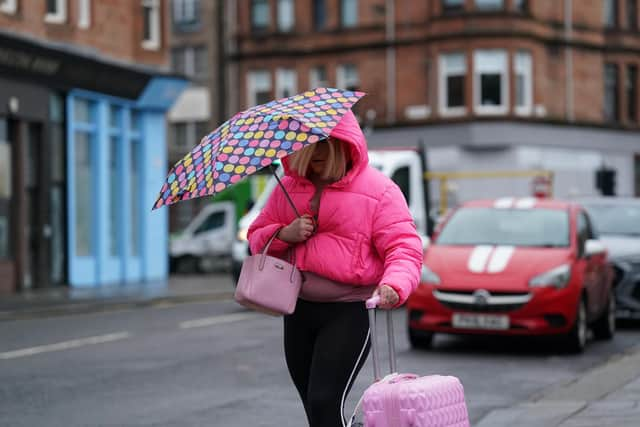Transgender activists are trying to use modern-day 'scold’s bridle' to silence critics. It will not work – Susan Dalgety
This article contains affiliate links. We may earn a small commission on items purchased through this article, but that does not affect our editorial judgement.
The first recorded reference to a scold’s bridle is in the Lanark Burgh Records of 1653. The device, made of leather and iron, was designed to punish a woman deemed to talk too much, and who expressed views unacceptable to society. The bridle was locked onto a woman’s head, not only to shut her up, but to act as warning to other women, lest they too felt the urge to speak out.
Nearly 400 years later, society doesn’t need the brutality of a scold’s bridle to silence women. The leather and iron has been replaced with trial by social media, commissions cancelled, jobs lost, reputations trashed. Fame doesn’t protect you, as JK Rowling discovered when she dared to tweet that sex is real. An impressive track record as one of Britain’s leading sportswomen did not protect Sharron Davies when she dared to say that men should not compete in women’s sport.
Advertisement
Hide AdAdvertisement
Hide AdNor does talent protect you, as singer Roisin Murphy found out recently when her own record company turned on her because she privately expressed concerns about the use of puberty blockers for young people with gender distress. And earlier this week, as public opinion was shown to have moved away from support for transgender rights, a senior SNP activist and trans-rights campaigner, Mhairi Hunter, pointed her finger at women’s rights campaigners by saying the shift was the result of “populist rabble-rousing”.


Never mind that in recent years people have become far better informed about gender ideology and its potential impact on women’s sex-based rights. Or that many were sickened when double rapist Adam Graham (aka Isla Bryson) was jailed, albeit temporarily, in a women’s prison. Ignore the desperate plight of young girls, stuffed full of puberty blockers to delay their body’s natural evolution because some doctors have fallen for the lie that human beings can change their sex.
And who cares if the British Social Attitudes Survey also shows that, while people are increasingly sceptical of trans ideology, Britain is a much more liberal-minded country than it was four decades ago? People’s current attitudes on gay sex, single parents and the role of women in the home are described by the study’s researchers as “a near revolution” in our society.
None of this matters, because in Mhairi Hunter’s world, women who speak out in support of their sex-based rights and to protect their children are “populist rabble-rousers”. In 17th-century Scotland, such women would have been punished with a scold’s bridle. Today, they are vilified on social media by government cheerleaders. Same old, same old.
But as Lady Haldane retired to consider her opinion on the evidence she heard in the Court of Session this week, where the UK Government defended its decision to veto the Scottish Government’s controversial gender reform bill, a book of poetry slipped out. Unbridled is a collection of poetry featuring women of all ages and backgrounds. It is, according to its editor, renowned Scottish poet Magi Gibson, an anthology that “sings defiantly of the living, breathing, everyday reality of womanhood”.
There are poems on menstruation, on miscarriage, on the horrors of being sexually abused, on being beaten, on coming to terms with infertility, on enduring hysterectomies, and on ageing. There are verses on feminism, the empowerment of the sisterhood and words of defiance.
“I am not a bitch, a Terf, a whore, a slag, hysterical, a witch, a slut, a hag. No! I am a woman, I am a female, who will not let her rights be put up for sale,” writes Brandubh, the youngest writer in the collection. There is a loving poem in memory of Mary Gordon, who died earlier this year. Mary hit the headlines in 2021 when she chalked the words “Women’s rights are not a hate crime” and “#Women are watching” on the walls of the Scottish Government’s head office, St Andrew’s House.
For her sin of dissent, she was rewarded, not with a scold’s bridle, but a visit from Police Scotland, who warned her that next time she would be charged with breach of the peace. Lorna Irvine writes in memory of her sister-friend, “we give you leith sunshine, violet haar, a cloak for blithe dissent smirr, a benediction for your ribbons”. And Cardiff artist Sonya Douglas, who was dropped from the Critically Speaking arts podcast for refusing to give her pronouns, writes in praise of all the women who stand up for their rights.
“Here’s to the women who know their worth,
And what their sisters are worth
Who birth daughters for warriors with only their words
And who step down from pedestals
Who rise up from doormats
Who hang their full weight from barred windows
And count reps while making their plans
Here’s to those women
Here’s to the women who stand.”
Advertisement
Hide AdAdvertisement
Hide AdThis is what activists like Mhairi Hunter, or her former boss Nicola Sturgeon, never understood. The campaign for women’s rights, which sparked into life about five years ago, is not "populist rabble-rousing” against a vulnerable minority. It was – it remains – an assertion by women of their right to speak out.
To be free to point at Adam Graham, in his crotch-revealing leggings and cheap blonde wig, and say, “he’s a man”. To be able to reassure their children they are not “trapped in the wrong body” because they are same-sex attracted, without interference from teachers. To have the confidence to say “no” to male bodies in places of refuge from violence and abuse and not be called a bigot. And to be able to stand up, unbridled, and say, we are women and this is the truth.
Comments
Want to join the conversation? Please or to comment on this article.